16+ Sample Buddy Checklist Templates
-
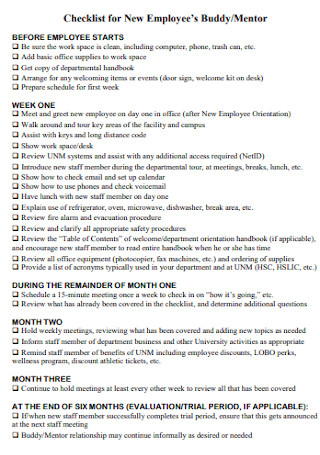
Checklist for New Employees Buddy
download now -
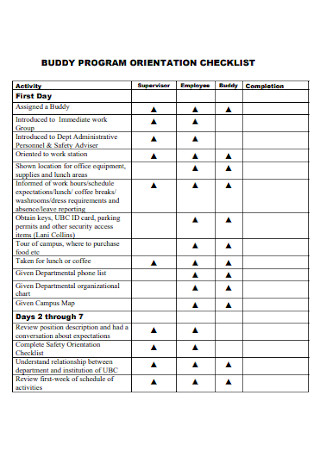
Buddy Program Orientation Checklist
download now -
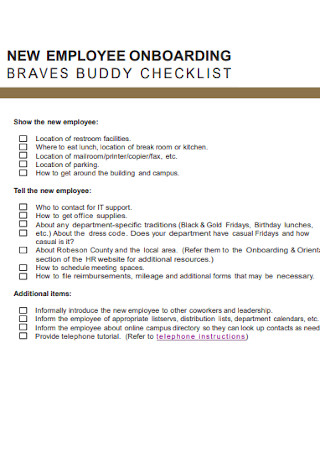
Braves Buddy Checklist Template
download now -
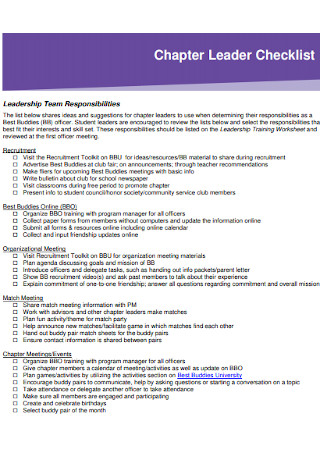
Buddy Leader Checklist
download now -
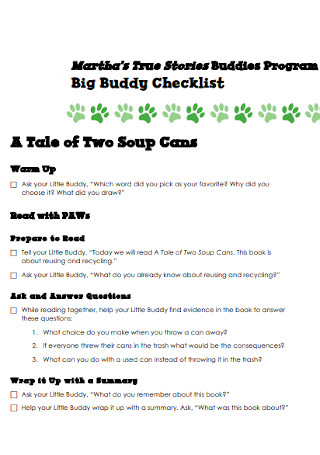
Big Buddy Checklist Template
download now -
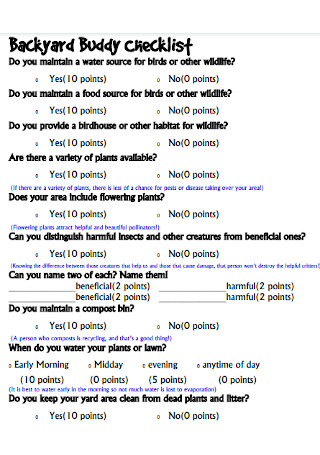
Backyard Buddy Checklist
download now -
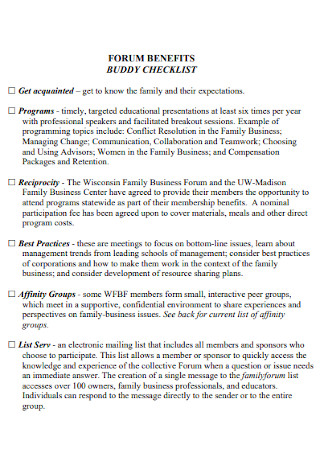
Simple Buddy Checklist Template
download now -
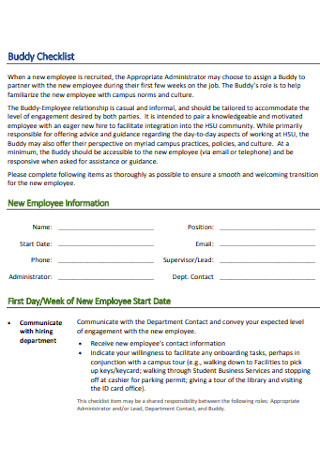
University Buddy Checklist Template
download now -
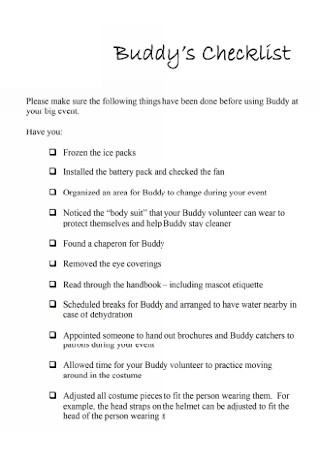
Basic Buddy Checklist Template
download now -
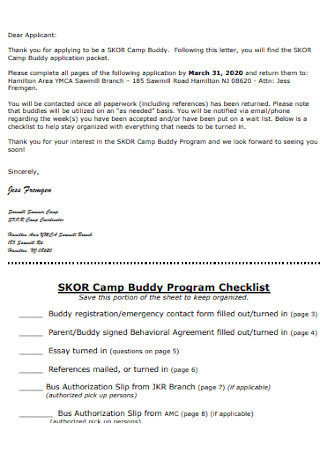
Camp Buddy Program Checklist
download now -
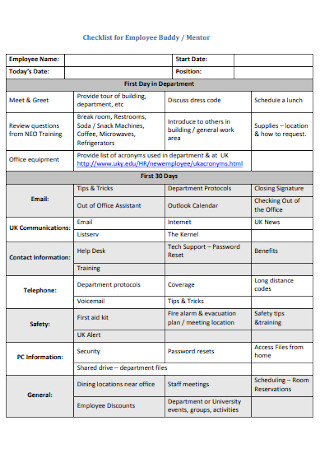
Checklist for Employee Buddy
download now -
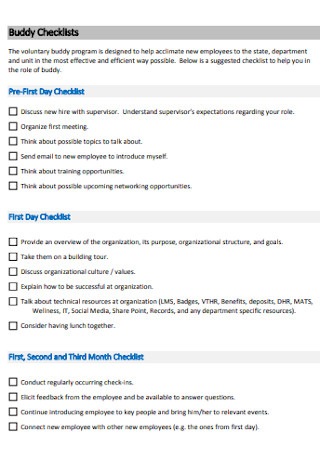
Buddy Checklist Format
download now -
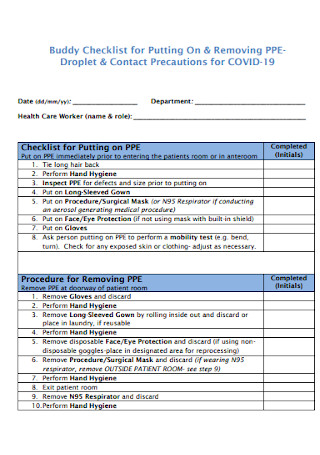
Buddy Checklist for Putting On
download now -
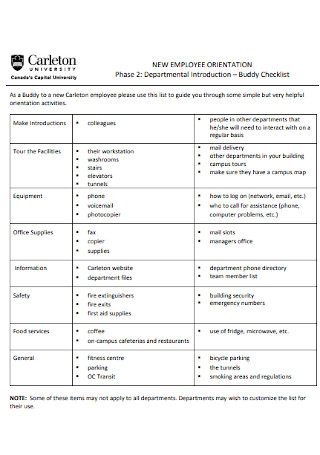
New Employee Buddy Checklist
download now -
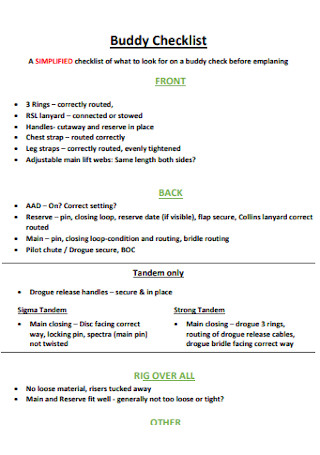
Standard Buddy Checklist Template
download now -
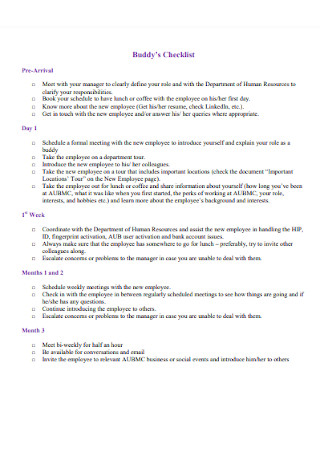
Buddy Pre -arrival Checklist
download now -
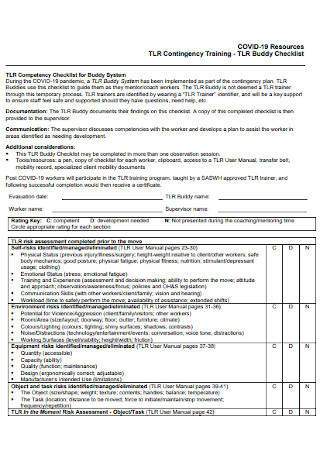
Buddy Contingency Training Checklist
download now
What Is a Buddy Checklist?
Before you get to know a buddy checklist, let us clarify what a buddy program is first. This buddy system is a recommended onboarding process in orienting a new employee to the work environment. It delves more than welcoming a new hire because orientation involves sharing some tips, answering questions, teaching—you name it. And every organization should value a buddy checklist, a detailed document that outlines the tasks of what the assigned buddy must accomplish in dealing with new workers. With this list, new hires and their designated buddies won’t have a difficult time working together for the first few days, weeks, or months in a job.
A 2011 study from the Society for Human Resource Management (SHRM) stated that 80% of organizations said they implemented informal or formal orientation systems for new hires.
Also, IT project managers from the National Institutes of Health John Cooper and Judy Wight encouraged to implement a buddy program in the workplace.
Meanwhile, Statista reported that two of the biggest enterprises worldwide, Walmart and China National Petroleum, provided jobs up to 2.2 million and 1.38 million people globally.
Why Are Buddy Checklists Important?
According to John Cooper and Judy Wight, aka IT project managers of the National Institutes of Health, we should all implement a buddy system at work. A buddy serves as the temporary trainer of a new employee, especially when new hires need someone to talk with during the first few days in a new job. But why is a checklist still necessary, you might ask? Buddy checklists are essential to be guided on how to be an excellent workplace buddy. Hence, expect the target audience of the checklist to be the assigned buddies. The checklist is like your standard to-do list where it highlights what you should do from start to finish. And when all items in the list are checked, that means the buddying job is done.
Also, you can’t deny that there can be tons of workers out there in a company. Take Walmart and China National Petroleum, for example. These two big companies gave jobs up to 2.2 million and 1.38 million people worldwide. And considering that most employees at work are busy, do you think everyone is prepared to be a buddy to help new workers right away? Absolutely not! That explains why a buddy checklist is, indeed, important. People designated to be buddies in the program won’t have to forget about their tasks because the list itself gives the proper instructions. All they need to do is follow the steps in the document.
What Makes a Good Buddy?
Yes, a new employee buddy checklist is advantageous. But what exactly makes a good buddy? Some of the characteristics you expect from a standard buddy consist of the following:
What Are the Responsibilities of a Buddy?
Based on SHRM’s 2011 research survey, about 80% of organizations admitted that they implemented informal or formal orientation programs for the new employees. And there are various orientation systems available; buddy programs are just one example. In order for buddy systems to work, buddies must be aware of their common responsibilities. And the standard buddy responsibilities contain the following:
Introduction
Just like an introductory statement, buddies should provide a brief introduction about what new employees must expect at work. This part is where you can give new hires a quick tour of the office, explain how to use the tools and equipment inside, and provide a basic 411 about the company’s objectives, regulations, and more.
Teaching
Buddy systems would not work without the teaching process. Ensure that newbies will be well-aware of their tasks, including what you think is unfamiliar to them. But, focus only on what you think newbies should learn that their coaches or trainers did not mention yet. That way, you avoid retelling similar teachings. And if the new workers have certain questions, be prepared to answer them politely.
Advice
Also related to teaching is giving advice. Yes, there are many things to teach about the new employee’s tasks, goal statements, etc. But you might know of special tips that can make their job less stressful or time-consuming. Thus, share them. Newbies would like it when buddies help them adjust to the whole work quickly. And you can start mentioning insights related to how processes are done in your business.
Socialize
Buddies must socialize with their assigned new employees to teach. Don’t just follow a checklist rigidly without considering the newbie’s feelings or personality. You can be polite by having small talk about their personal lives for a while. Another idea is to introduce them to other coworkers. Or perhaps, you offer them some coffee, beverage, or snacks as a break.
How to Create a Buddy Checklist
You already took all the information there is to know about a buddy checklist’s meaning, importance, characteristics, and responsibilities. Now, for the main course, are you prepared to make the buddy checklist itself? Don’t fret. The process is too easy and you only need to follow these five basic steps:
Step 1: Design a Buddy Program
Do not make a buddy checklist right away without a clear buddy program prepared yet. Prepare a draft to document how the buddy system works from its purpose, objectives, rules, schedule, and so much more. Conflicts would take over without proper regulations, schedules, and documentation. In designing buddy systems, you can incorporate a SWOT analysis to ensure you know what to document for the program to be effective.
Step 2: Identify the Expected Buddy
To whom is the employee onboarding checklist for? The buddies. Confirm who the expected buddy or designated buddies are. Why so? Identifying them helps you know how to tailor the buddy checklist’s content that will work for them too. Sometimes, one buddy checklist does not work for every buddy assigned; personalizing the list is alright. For example, one buddy might not be able to achieve 12 tasks from the checklist in a day but another buddy can. Hence, adjust the details.
Step 3: List the Buddy Responsibilities
Look for a buddy checklist template from the samples above until you can begin listing the buddy responsibilities. Besides the responsibilities mentioned earlier, you can always add more. However, don’t just blindly list every task without a sense of organization. Arrange them into categories, perhaps. An example is to divide tasks according to dates, like when you list the responsibilities for day one, day two, and so forth. But be sure you prioritize knowledge sharing in those tasks so new hires really learn something from the experience.
Step 4: Finalize the Design and Format
Our sample templates are all customizable, so be sure to tweak their settings and come up with a better format and design. You can decide if the checklist should be a printed document or maybe just a soft copy. And most importantly, checklists should have a checkbox per item. Buddies will put checkmarks on each box once every task is completed. Another tip is to include instructions so buddies will be guided on how to work with the document. It should be easy to use or there will be a problem.
Step 5: Provide Feedback
It is no surprise that giving feedback is one of the crucial steps here. Expect to evaluate the buddy, the new employee, and the checklist itself. Provide feedback if you think the buddy who followed the list actually performed well. The same goes for checking if the new hire has learned a lot. And for the checklist, it is essential to put some improvements if needed. That way, better buddy checklists will be formed to boost the success rate of the program.
FAQs
Is a buddy also a mentor?
A buddy may have tasks similar to a mentor, coach, or supervisor but buddies are not substitutes for mentors. Buddies are more on answering the new employee’s questions or teaching some common operations. When it comes to job-specific performance and professional development plans, mentors and coaches are responsible for those.
How long does a buddy program last?
How long a buddy program is depends on the organization that provided it. There are companies that give two weeks for the buddy system while some can reach a few months. The difference also depends on how complicated the job is, which usually takes longer for difficult jobs.
What are some ideal tips for the buddy?
Not every buddy has to be a pro of everything, but they can work well with these tips:
- Be patient in dealing with different personalities.
- Do not finish all tasks in a checklist for one day.
- Observe an optimistic teaching attitude.
- Do not be judgmental.
- Ask for help if needed.
- Practice how you would handle the enlisted responsibilities.
Albeit buddy programs for new hires are helpful, don’t forget that they also take some time, effort, and care. But it gets easier along the way when buddies deal with more new employees along with discovering new techniques to handle the system quicker and more effectively. Just remember the basic rules: (1) choose a responsible buddy, (2) use a buddy checklist, and (3) revise the program as you learn from the experience. Transform your new hires into their best versions by being guided by our sample buddy checklist templates.
